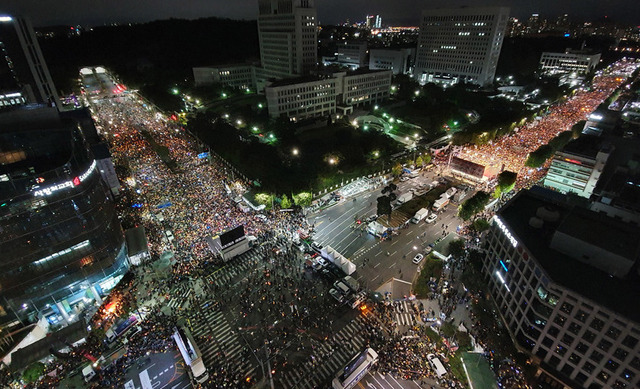Posted on : Oct.7,2019 17:11 KST
Modified on : Oct.7,2019 17:11 KST
 |
|
Civic demonstrators rally for prosecutorial reform near the Seoul Central District Prosecutors’ Office in Seoul on Oct. 5. (Kim Myoung-jin, staff photographer)
|
For the second week in a row, South Koreans raised their candles to call for prosecutorial reform. This past Saturday, even more people assembled near a branch of the public prosecutors in Seoul’s Seocho neighborhood. Such demonstrations are likely to continue for the time being.
The main reason the candles have been lit again after the candlelight revolution that toppled former president Park Geun-hye three years ago is the demand for prosecutorial reform. People who think the prosecutors have gone too far in their investigation of Justice Minister Cho Kuk and his family seem to have risen up with grave concern that the reform drive may be thwarted. They also seem to be worried that the vested interests that had lain low over the past three years are starting to push back against reform, using the prosecutors as a shield. Not only the investigating prosecutors but also the ruling Democratic Party, the Blue House, and the government must listen carefully to what the candlelight demonstrators have to say.
“We asked for comprehensive reforms, and all they did was scratch the surface,” said one citizen who attended a candlelight demonstration in Seoul’s Seocho neighborhood, criticizing the recent reform plan presented by prosecutors, on Oct. 5. Another visiting from Busan said, “To see the prosecutors putting dozens of people on the Cho Kuk investigation after glossing over the Kim Hak-ui and Jang Ja-yeon cases, I really sensed how ruthless they are when investigating people who pose a threat to their vested interests.”
 |
|
Demonstrators hold up signs criticizing prosecutors, the press, and the opposition parties near the Seoul Central District Prosecutors’ Office on Oct. 5. (Kim Myoung-jin, staff photographer)
|
In some sense, the distrust toward their practices is a form of “karma” for cover-ups and distortions in past investigations. To be sure, some of the attendees separated the question of prosecutorial reform from their feelings about Cho as a person. “My attitude toward Cho Kuk as a person is negative,” said one attendee, who added, “We cannot afford to back down on prosecution reforms.” But the prosecution leadership should be taking to heart the blistering rebuke from prosecutor Im Eun-jeong, who stressed that “selective investigations and selective justice are twisting judicial justice” while appearing as a witness on Oct. 4 in a parliamentary audit by the National Assembly Public Administration and Security Committee.
The investigation of Cho Kuk got off to a bad start. As has been pointed out repeatedly, the investigation process was inappropriate from the get-go, and the procedures and process have warranted being described as “excessive.” Prosecutors have faced a backlash over actions including a raid on Cho’s house conducted just before his hearing, a late-night indictment while it was going on, and a subsequent 11-hour search and seizure operation.
Despite the prosecutor’s arbitrary sharing of allegations, the key issues remain heavily disputed. An Oct. 4 report on the MBC documentary program “PD Notebook” raises questions in particular about the prosecutors’ claims of falsification concerning a Dongyang University commendation. A Dongyang employee shared an eyewitness account exposing the holes in the prosecutors’ slipshod investigation, raising fundamental questions about how much it can be trusted. The private equity fund investigation, which has been the biggest area of focus for prosecutors, has drawn accusations of being a targeted “mix-and-match” operation against Cho’s wife, professor Chung Kyung-shim, contingent on the concealment of crimes by financiers investigating massive sums of around 10 billion won (US$8.35 million). In addition to pursuing reports, we hope the prosecutors under Yoon Seok-youl will take another long look at the investigations they have under way.
The candlelight-carrying citizens have also called for reform to the media, which do indeed need to consider whether they might not have some things to reflect over. Politicians, for their part, need to focus their energies on prosecutorial and other reform legislation and tending to the public’s livelihoods rather than allowing the Cho case to turn into a black hole. This is at heart what the candles are calling for.
Please direct comments or questions to [english@hani.co.kr]










